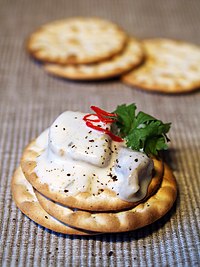Our website is made possible by displaying online advertisements to our visitors.
Please consider supporting us by disabling your ad blocker.
Cracker (food)
This article needs additional citations for verification. (October 2017) |
 | |
| Place of origin | various |
|---|---|
| Created by | unknown |
| Main ingredients | flour, water |
| Variations | papadum, senbei and num kreab |
A cracker is a flat, dry baked biscuit typically made with flour. Flavorings or seasonings, such as salt, herbs, seeds, or cheese, may be added to the dough or sprinkled on top before baking.[1] Crackers are often branded as a nutritious and convenient way to consume a staple food or cereal grain.

Crackers can be eaten on their own, but can also accompany other food items such as cheese or meat slices, fruits, dips, or soft spreads such as jam, butter, peanut butter, or mousse. Bland or mild crackers are sometimes used as a palate cleanser in food product testing or flavor testing, between samples. Crackers may also be crumbled and added to soup.[2] The modern cracker is somewhat similar to nautical ship's biscuits,[3] military hardtack, chacknels,[4] and sacramental bread. Other early versions of the cracker can be found in ancient flatbreads, such as lavash, pita, matzo, flatbrød, and crispbread. Asian analogues include papadum, senbei and num kreab.
The characteristic holes found in many crackers are called "docking" holes. The holes are poked in the dough to stop overly large air pockets from forming in the cracker while baking.
- ^ Cite error: The named reference
Manley 2011was invoked but never defined (see the help page). - ^ "The right moves for soup sippers". tribunedigital-baltimoresun. Archived from the original on 2018-11-07. Retrieved 2018-11-07.
- ^ Gooii. "Hardtack (Ships Biscuits) recipe - Cookit!". cookit.e2bn.org. Retrieved 2018-11-07.
- ^ Raffald, Elizabeth (1818). The Experienced English Housekeeper: For the Use and Ease of Ladies, Housekeepers, Cooks, &c.: Written Purely from Practice, and Dedicated to the Hon. Lady Elizabeth Warburton, Whom the Author Lately Served as Housekeeper, Consisting of Near Nine Hundred Original Receipts, Most of which Never Appeared in Print ... with Two Plans of a Grand Table of Two Covers and a Curious New Invented Fire Stove Wherein Any Common Fuel May be Burnt Instead of Charcoal. James Webster.
Previous Page Next Page


